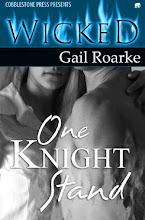Welcome to another weekly post in the How I Write series. This series of posts is the brainchild of Ansha Kotyk, who--along with the other participants, including Yours Truly--haunts the forums (registration required) of the Romance Divas website. You can go here to find a list of all the participants with links to their individual blog posts. We'll each be posting on the same topic each Wednesday for the next two or three months--longer, if it goes well and we're having fun with it.
This week's topic is open--we all can write about whatever topic we choose.
I choose: burnout. Or, the necessity for time off.
Regular readers of my contributions to this series know I'm a big proponent of Heinlein's Rules For Writers. Because they're invaluable, I'll post them. One. More. Time.
- You must write.
- You must finish what you write.
- You must not rewrite except to editorial order.
- You must send your story to an editor who will buy it.
- You must keep your story in the mail until someone buys it.
Something else that needs discussion, though, is time off.
When you're self-employed, you have to be your own boss. Kristine Katheryn Rusch (whose website I linked to last week) is doing a series of posts about the freelance life. She makes that point--you have to be your own boss, and you have to be a strict taskmaster. Freelancers have nobody standing over them, demanding that they do a job in return for a regular paycheck. That means you have to motivate yourself.
You also need to treat yourself like an employee in another fashion: giving yourself permission to be ill, or to take a vacation. It can be stressful, knowing that the onus is on you to bring home the bacon, or when you're just starting out, to try to break into the writing field so you can begin to bring home the bacon. It takes time. Most "overnight sensations" in any field are people who worked for years, laboring away in obscurity, mastering their craft, before they found themselves in the right place at the right time with the right product (be it a novel, a screenplay, an invention, a service) to become an "instant" success.
In one way, writing is like any other sales job: you have to be prepared to hear "no" far more often than you'll hear "yes" from prospective clients (editors). If you produce enough stories or novels, and you work at improving your craft every day, and you keep them out there (Heinlein's Rules, again), eventually you'll start hearing "yes" occasionally, and then more often. But you're going to hear "no" a lot too. Even the greatest salesman can't sell to everyone, even with the greatest product in the world. To turn Lincoln's phrase on its head, "You can sell to all of the people some of the time, and some of the people all of the time, but you can't sell to all of the people all of the time."
It can be wearying. Depressing, even. Even when you're selling everything you write, you're still going to need to take time off sometimes. You're only human. But when you're still trying to get your foot in the door, it can be more difficult to justify taking time off. Cashing a royalty check makes it a lot easier to tell yourself that you deserve a rest. If you're still trying to make that first big sale, when you have nothing to show yet for all your hard work, it's a lot more difficult.
But you still need it. Burning yourself out helps no one. It won't improve your craft. It won't sell your work any faster. It won't give you the wherewithal to support your spouse in the manner to which he or she would like to become accustomed. But it can drain all the joy out of what should be a great job. You're getting paid (or hope to get paid eventually) to sit alone in a room and make shit up. If you're not enjoying it anymore, you're doing something wrong.
That's not to say that there won't be days when it feels like work, because it is work. It's a job. But if you feel like you might as well be punching a clock in an office, well, it's like the old vaudeville joke:
Patient: "Doctor, doctor--it hurts when I do that!"
Doctor: "Then don't do that!" (rimshot)
Don't do that. Sometimes you need to step away from the keyboard, put all the stories and story ideas and possible markets and calls for anthologies out of your mind. You need to rest. You need to take a vacation. And you're entitled to one, like everyone else. Rest your mind. Rest your spirit. Let your mental garden lie fallow for a time. In the long run it will help.
I've been spinning my wheels for the last month or more. According to my original plan for the year, I should be most of the way through a third novel. I haven't even started it yet. And yes, four novels is an ambitious goal for someone who never wrote even one before this past year. If I get three done, it'll still be a hell of an accomplishment. I still want to manage four, if possible. But right now, it's time for me to step back. I'm going to take a few days off from my writing. I'll write if I feel like it, if it's something I want to write. But otherwise, not. Not for the next few days.
I'll see you all again then.










Love the post. I think because I identify with it so well! Because my kids are little they need a lot of attention and without preschool, summers are tough. I fought for writing time constantly in the beginning of the summer, spinning my wheels and only feeling resentful. By early July I realized I needed to just go with the flow and take a break. Now that school will be starting in a few weeks I'm excited again to get back to my day job, WRITING! Thanks Gail!!
ReplyDelete